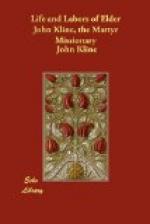But it will not do to leave the matter thus. The quotations and references I have given are so strong they almost overwhelm us. We almost cry out when we hear or read them, as the disciples did when the Lord had just told them of the impossibility of a rich man’s entering the kingdom of heaven: “Who then can be saved?” But I give you the same answer the Lord gave the disciples: “With men this is impossible: but with God all things are possible.” It is the Lord who gives us the power to repent. Bartimeus could not see until the Lord opened his eyes. But when he called, the Lord heard. So we must call. “And whosoever shall call on the name of the Lord, shall be saved.” This is faith; and I may here add the Lord’s words: “I am come a light into the world, that whosoever believeth on me should not abide in darkness.” But remission of sins is as sure to follow true repentance as day is sure to follow the darkest night. “Every good tree bringeth forth good fruit.” Remission of sins, and a life of good works, is the fruit borne by the penitent man symbolized by a good tree. And what does remission of sins imply? It implies casting our sins behind us; forsaking them; leaving them off, and not looking back. It implies putting one’s hand to the plow in a new field of life and labor, and never looking back. “He that putteth his hand to the plow, and looketh back, is not fit for the kingdom.” Looking back with a longing eye, as Lot’s wife did, is sure proof that we have not fairly remitted our sins in heart, but that we still love them.
I perceive from the expression of some faces that surprise is felt at my intimation that man remits his own sins. But he does as truly as he destroys the grass from among his corn or the weeds from his garden. God gives him the strength and the will to do both, but man has his work to do. He must be a coworker with God. Would there be any good in blind eyes being restored to sight, unless man would be willing to see with them? Or any good in palsied arms made strong, unless they were used to do good? Or any good in having the whole leprous body cleansed, unless the cleansed man would return to give glory to God?
Isaiah’s very first vision of the church called forth that wonderful exclamation: “Wash you, make you clean; put away the evil of your doings from before mine eyes: cease to do evil; learn to do well.” This, when done, is the remission of sins. It is sending them back, to the rear; while we have the Lord always before our eyes. He said to the blind Pharisees: “Cleanse first the INSIDE of the cup and the platter, that the outside may be clean also.” Paul says: “Let us cleanse ourselves from all filthiness of the flesh and SPIRIT.” James says: “Cleanse your hands, ye sinners; and purify your hearts, ye double minded.” Does not all this look as if man had a good deal to do with the remission of his sins?




